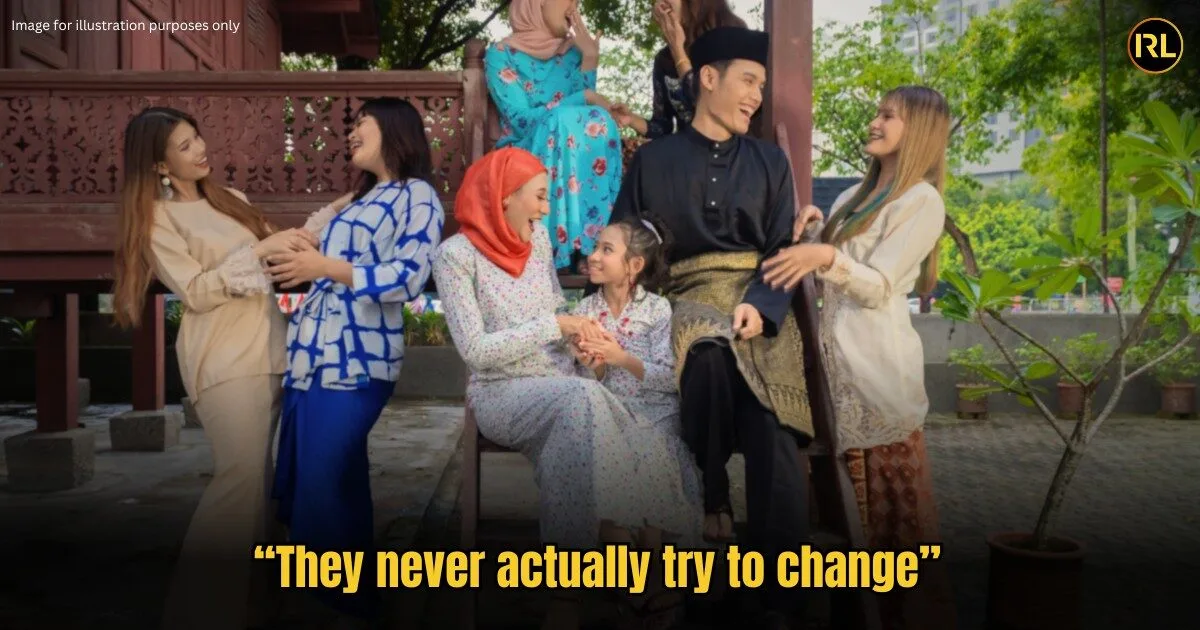
This story is about the unspoken frustration of watching people treat Hari Raya as a yearly “reset button,” where empty apologies and forced smiles replace real accountability.
I love Hari Raya. I love the smell of freshly-made rendang filling the house, the laughter of kids running around in their new baju raya, and the way the whole kampung comes alive with fireworks and late-night gossip sessions.
What I don’t love is how some people treat Raya like a giant ctrl+alt+delete button for all the bad behavior they’ve put me through the entire year.
Every year, like clockwork, the same people who have borrowed money and “forgotten” to pay me back suddenly remember I exist. They never call to check in, never text to ask how I am, but the moment the Raya spirit kicks in, suddenly, we’re best friends again. My uncle, for example, still owes me RM2,000 from three years ago. That money wasn’t for fun—it wasn’t for a holiday or some big purchase. It was because he came to me, eyes full of desperation, saying he needed it to “settle something urgent.” He promised he’d pay me back in a month. That was three years ago.
Oh, rezeki ada eh? But not the kind of rezeki that allows you to pay back what you owe people?
Since then, I’ve heard every excuse under the sun. “Bulan ni tight sikit, bulan depan boleh?” “Alamak, aku ada komitmen lain dulu, nanti aku bayar.” Then came the slow fade—messages left on read, vague “InsyaAllah” responses when I asked about it. And yet, somehow, despite this so-called financial struggle, he has no problem keeping up with his lifestyle upgrade. Just last year, I saw him post a picture of his new custom-made sofa set, captioned “Bini nak tukar vibe rumah, rezeki ada, tukar je lah.” Oh, rezeki ada eh? But not the kind of rezeki that allows you to pay back what you owe people?
When I brought it up during Raya last year, he had the audacity to laugh it off. “Ala, Raya kan? Kau halalkan jelah.” Like lemang and ketupat are some magical currency that cancels out debt. Like the act of salam-salaman is supposed to erase my memory of the months—years—of waiting for my money. And then, as if to rub salt in the wound, he flexed his new car on Facebook a few days later, complete with the caption “Syukur rezeki tahun ni.”
Syukur, huh? Funny how that “rezeki” always seems to work out for him but never extends to paying back the people who helped him when he needed it.
Then there’s my cousin, the one who only seems to remember we’re related when it’s time for Raya. The rest of the year? She acts like she’s starring in her own drama series, and I’m just some side character she gets to insult for free entertainment. At every family gathering, she always finds a way to bring me down—sometimes subtly, sometimes right to my face.
“Eh, kerja kau tu okay ke? Gaji cukup ke, or still makan maggi?” she once asked me, loudly, in front of the whole family, as if my financial stability was some kind of community discussion. Another time, when my aunties were chatting about their kids getting married, she just had to add, “Takpe, nanti jodoh sampai lah. Maybe lambat sikit sebab picky sangat.” Mind you, I had never once told her I was “picky.” But somehow, she had assigned that narrative to me, and the whole table nodded along like she was delivering words of wisdom.
When my aunties were chatting about their kids getting married, she just had to add, “Takpe, nanti jodoh sampai lah. Maybe lambat sikit sebab picky sangat.”
The best part? The gossiping. If I so much as wear a slightly more expensive handbag, suddenly, I’m “showing off.” If I post a vacation photo, she’ll be the first to whisper to the aunties, “Tak tahulah duit dari mana.” And if I keep quiet and mind my own business? Oh, then I’m sombong. There’s no winning with her.
But come Raya, all that disappears like magic. The moment we salam, she gives me her best guilty tapi tak guilty face—the one where she smiles a little too wide, her tone a little too sweet—and says, “Kalau ada salah silap, maaf zahir batin ya?” No specifics, no acknowledgment, just a vague, lazy statement designed to wipe her slate clean.
And just like that, she expects me to pretend the whole year of unnecessary drama never happened. No real apology, no self-awareness—just a performative “forgiveness” ritual so she can feel good about herself before going right back to her usual behavior. And guess what? Next year, we’ll be having this exact same conversation, with her giving the same fake apology, and me wondering why I even bother engaging.
Here’s what people don’t seem to get about forgiveness during Raya: it’s not a get-out-of-jail-free card.
It’s not some magical loophole that lets you be an insufferable person for 11 months and then erase it all with a half-hearted “maaf zahir batin.” True forgiveness—the kind Islam actually teaches—is about wiping the slate clean after you’ve done your best to be a decent human being. It’s about acknowledging your mistakes, making things right, and then seeking forgiveness with sincerity.
But what I see every year is the complete opposite. People use Raya as an excuse to avoid taking responsibility. They never actually try to change, they never make amends, they never even say a proper sorry—they just do whatever they want and then expect a clean reset the moment Syawal arrives. It’s the emotional equivalent of sweeping everything under the carpet and pretending the house is clean.
If you’ve hurt someone, forgiveness isn’t just about saying a few pretty words—it’s about making things right.
You don’t get to be a toxic relative all year long and then wash your hands of it just because it’s Raya. You don’t get to borrow money, ignore repayment for years, and then expect a salam to cancel the debt. You don’t get to belittle people, gossip about them, make them feel small, and then act like it’s all good just because you posted a “Selamat Hari Raya” message on WhatsApp.
Forgiveness in Raya is supposed to be meaningful. It’s about strengthening bonds, not manipulating them. It’s about saying, “I’ve done my best to be good to you, and if I’ve failed in any way, I sincerely ask for your forgiveness.” Not, “Eh sorry lah kalau ada buat salah. You pun jangan simpan dalam hati tau.”
And that’s the thing—people like my uncle and my cousin don’t actually want to repair relationships. They just don’t want to deal with the consequences of their actions. They don’t want real forgiveness, they want an easy way out. But forgiveness isn’t supposed to be a shortcut. It’s supposed to mean something. And until people understand that, I see no reason why I should keep playing along.
People use Raya as an excuse to avoid taking responsibility.
So this year, I’m done playing along. I’m done pretending that a forced salam and a recycled maaf zahir batin cancels out an entire year of selfishness, broken promises, and convenient amnesia. I’m done letting people use Raya as a reset button when they’ve done nothing to deserve a reset.
When my uncle inevitably tries to laugh off his debt again, I’m going to smile and say, “Boleh halalkan—lepas abang bayar separuh dulu.” When my cousin pulls her usual fake-apology stunt, I’ll just nod and reply, “Oh, you buat salah ke? Patutlah rasa pelik.”
Because I’ve realized that forgiveness isn’t just about letting go—it’s also about knowing who deserves a fresh start, and who’s just looking for an excuse to repeat the same cycle. Raya is about renewal, yes, but real renewal doesn’t happen unless you actually do the work.
So this year, I will celebrate Hari Raya with a full heart, with the people who truly matter. I will forgive, but only where forgiveness is earned. And most of all, I will remind myself that maaf doesn’t mean makan hati. Some things aren’t meant to be swept under the carpet—especially not when you know the dust will just pile up again next year.
Have a story to share?
Submit your story to ym.efillaerni@olleh and you may be featured on In Real Life Malaysia.
Read also: “RM15 For Roti John? Even McD Cheaper Leah,” Shares M’sian Shocked By Ramadan Bazaar Prices
“RM15 For Roti John? Even McD Cheaper Lah,” Shares M’sian Shocked By Ramadan Bazaar Prices
More from Family Drama
‘My parents only cared about our family image’ Shares 29 YO Malaysian woman
This story is about a Malaysian woman who grew up thinking her childhood was normal, until therapy helped her understand …
‘I was raised thinking my mom was my sister’ shares 38 YO M’sian Man
This is the story of a Malaysian man who discovered, by accident, that his parents were not his parents, and …
‘My husband took RM100K in loans to fund our holiday’ shares 35 YO Msian woman
This story is about a Malaysian housewife who trusted her husband to provide, only to discover their dream life was …















